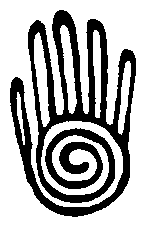What is Reiki?
Reiki is a system of energy healing that was developed in Japan. Reiki works to harmonize your body's own subtle energy field, or "ki"(pronounced "chee"). If you are new to Reiki, you do not need to understand how the energy of the body works in order to use or benefit from Reiki--we know that with Reiki, we are all connected; the world is one.
Reiki acts deeply on the body, mind and spirit. Some clients experience it as a stress reduction and relaxation session that brings them to a state of calm and presence. For this reason, Reiki is used alongside medical interventions with no complications to promote systemic balance in the body.
Reiki has no dogma nor does it involve a belief system. It is subtle, but responses to this subtle touch modality can be dramatic. It is not a conventional medical technique, but aims for balancing the overall system, as most conventional medical treatments aim to cure or to manage illness.
In conventional terms, Reiki can be thought of as a method for eliciting the body’s relaxation response. As the autonomic nervous system is calmed with Reiki, the breath rate, blood pressure and heart rate all have been observed to lower. It is a method that coaxes the body back into a state of balance, calm and relaxed awareness, which creates an experience of well-being and a return to an integrated sense of mind and body.
Description of a Reiki Treatment
A Reiki treatment can be done while the client is seated in a chair or lying on a massage table in a quiet, relaxed setting. It involves light touch to a fully clothed recipient. Reiki comes through the Reiki practitioner, so she prepares herself to be a clear and open channel for Reiki to flow to the recipient. The Reiki practitioner gently places her hands on different parts of the client's body as a way to direct the Reiki. The client may first feel a sensation of heat coming from the practitioner's hands and this is normal. As the session progresses, the client may drift off into a dreamlike state or even fall asleep...do not worry, just let it flow. Although Reiki sessions can be as brief as 15 minutes, most sessions last about 1 hour.
Reiki treatments are versatile and can be modified to meet the needs of any client. They can be given in the home, in a practitioner's office, in acute care or crisis settings (such as accident scenes), in the operating room, in hospital settings, or in outpatient clinics. No diagnosis is performed nor needed. We have found that patients and cancer survivors respond best to treatments that last from 45 minutes to 1 hour.
Reiki was originally developed by Mikao Usui in the early 1900s in Japan. Rei means spiritual/universal wisdom, and ki means energy, so Reiki is often translated as universal life force energy.


